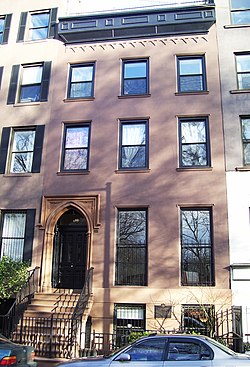Charlie Parker
| Charlie Parker | |
|---|---|

Parker at Three Deuces, New York in 1947
|
|
| Background information | |
| Birth name | Charles Parker, Jr. |
| Also known as | Bird, Yardbird |
| Born |
August 29, 1920 Kansas City, Kansas, U.S. |
| Died | March 12, 1955 (aged 34) New York City, New York, U.S. |
| Genres | |
| Occupation(s) |
|
| Instruments | Alto and tenor saxophone |
| Years active | 1937–55 |
| Labels | |
| Associated acts | |
| Website | cmgww |
| Notable instruments | |
| Buescher, Conn, King and Grafton alto saxophones | |
|
Charlie Parker Residence
|
|

151 Avenue B in 2011
|
|
| Location | 151 Avenue B Manhattan, New York City |
|---|---|
| Coordinates | 40°43′36″N 73°58′50″W / 40.72667°N 73.98056°W |
| Built | circa 1849 |
| Architectural style | Gothic Revival |
| NRHP Reference # | 94000262 |
| Significant dates | |
| Added to NRHP | April 7, 1994 |
| Designated NRHP | April 7, 1994 |
| Designated NYCL | May 18, 1999 |
Charles "Charlie" Parker, Jr. (August 29, 1920 – March 12, 1955), also known as Yardbird and Bird, was an American jazz saxophonist and composer.
Parker was a highly influential jazz soloist and a leading figure in the development of bebop, a form of jazz characterized by fast tempos, virtuosic technique and advanced harmonies. Parker was a blazingly fast virtuoso, and he introduced revolutionary harmonic ideas including rapid passing chords, new variants of altered chords, and chord substitutions. His tone ranged from clean and penetrating to sweet and somber. Parker acquired the nickname "Yardbird" early in his career. This, and the shortened form "Bird", continued to be used for the rest of his life, inspiring the titles of a number of Parker compositions, such as "Yardbird Suite", "Ornithology", "Bird Gets the Worm", and "Bird of Paradise". Parker was an icon for the hipster subculture and later the Beat Generation, personifying the jazz musician as an uncompromising artist and intellectual rather than just an entertainer.
Charles Parker, Jr. was born in Kansas City, Kansas, and raised in Kansas City, Missouri, the only child of Adelaide "Addie" (Bailey) and Charles Parker. He attended Lincoln High School in September 1934, but withdrew in December 1935, just before joining the local musicians' union.
Parker began playing the saxophone at age 11, and at age 14 he joined his school's band using a rented school instrument. His father, Charles, was often absent but provided some musical influence; he was a pianist, dancer and singer on the T.O.B.A. circuit. He later became a Pullman waiter or chef on the railways. Parker's mother Addie worked nights at the local Western Union office. His biggest influence at that time was a young trombone player who taught him the basics of improvisation.
In the late 1930s Parker began to practice diligently. During this period he mastered improvisation and developed some of the ideas that led to bebop. In an interview with Paul Desmond, he said that he spent three to four years practicing up to 15 hours a day.
...
Wikipedia

